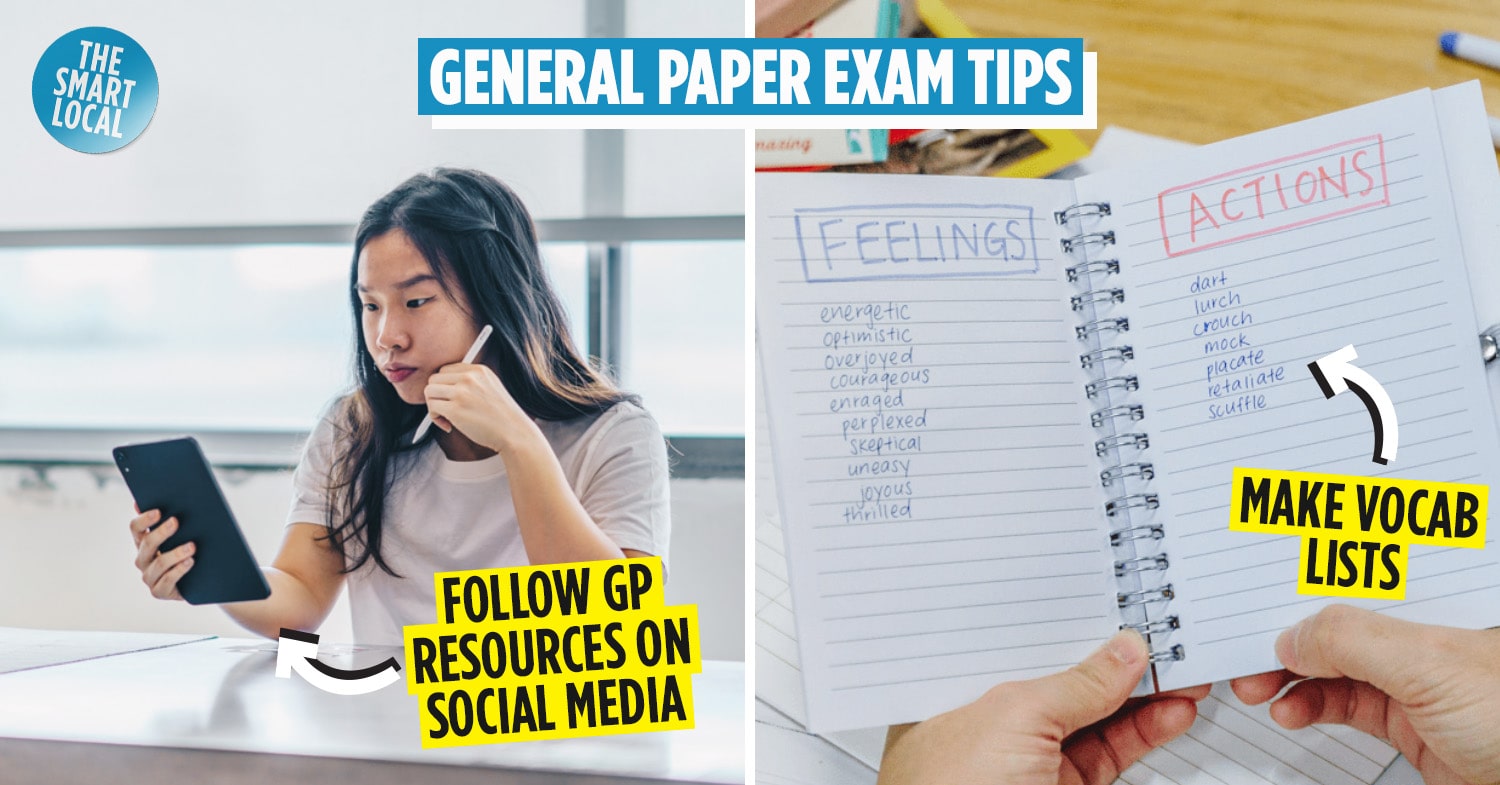General Paper A Level tips
“No need to study for GP lah. You’re either good at it or you’re not.” You might have heard or said this many times before, or even said it yourself. But according to students who have just finished their A levels and General Paper tutors themselves, there are definitely ways to up your GP game.
To get the deets on how to do well for GP, we talked to some students who’ve just finished their A levels, as well as a couple of GP tutors to get the best essay tips for you to ace your A level General Paper Exams:
The A Level General Paper
The General Paper exam is divided into Paper 1 – the Essay section – and Paper 2 – the Comprehension section. Both carry the same mark weightage and have the same duration, so they are both equally important. To do well for GP, you’ll need to think critically, read and understand, and communicate your ideas clearly and effectively.
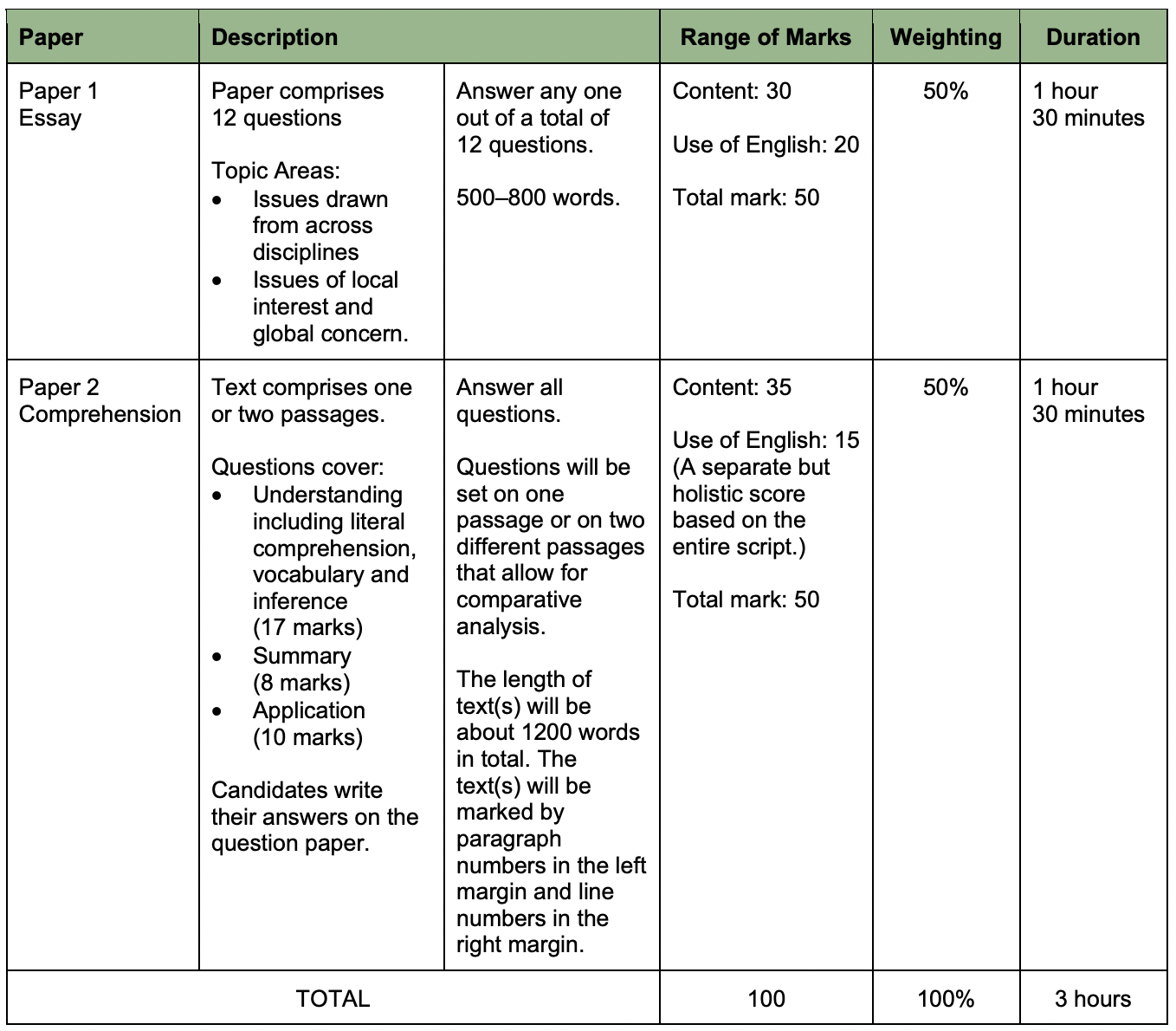
Image adapted from: Singapore Examinations and Assessments Board
According to the Singapore Examinations and Assessments Board, suggested topics that will be covered are:
- Historical, social, cultural, economic, political and philosophical topics
- Science including its history, philosophy, general principles, current developments and applications
- Mathematical and geographical topics
- Literature and language
- Arts and crafts
- Topics of local interest and global concern
1. Don’t be kiasu and study everything
There are a total of 12 questions for Paper 1 of the General Paper exam, from which you’ll choose only 1 to answer.
But you won’t have time to study everything. JC students we spoke to said their teachers advised them to specialise broadly in 3 to 4 of these topics, especially those that they are interested in or feel passionately about.
However, you’ll need to be well-prepared for a wide range of approaches by reading widely, doing research and thinking through subtopics within your chosen three to four topics.
2. Let your social media work for you
While you’re keeping up with the Kardashians on social media, also follow IG news channels like @washingtonpost and @newyorktimes so that you see these on your feed while you’re scrolling on the MRT. There are also General Paper-specific IG accounts such as @generalpaper.

Image adapted from: @washingtonpost, @verbaldarrell, MS News
If TikTok is more your jam, @verbaldarrell is a tutor who frequently shares videos about exam tips and how to approach common GP topics. @guardian, @cnn and @time are some of the credible sources you can follow to keep you well informed about current affairs.
3. Revise on the go by taking notes on apps like Evernote

When you come across good articles online, clip them on your device or browser to a note-taking app such as Evernote, Notion or other free software. Later, you can compile GP notes on multi-device apps like Google Docs so that you can revise on the go.
4. Follow news from both ends of the political spectrum
Read news from sites that represent both sides of the political spectrum – that way, you can provide balanced points of view when you’re tackling your General Paper essay questions.
Follow international sites like CNN, BBC, and AP News for international news. But since a lot of GP questions will ask about a topic in the context of “your country”, make sure you also follow local news sites like MS News, Straits Times, CNA for a Singapore perspective.
A GP tutor we spoke to said that you should not just read the news, but also think about the news – e.g. the reasons why the article is in the news, whose stand the article is representing, and what the possible consequences of the news platform taking such a stand might be.
5. Join Telegram groups for the latest free online resources
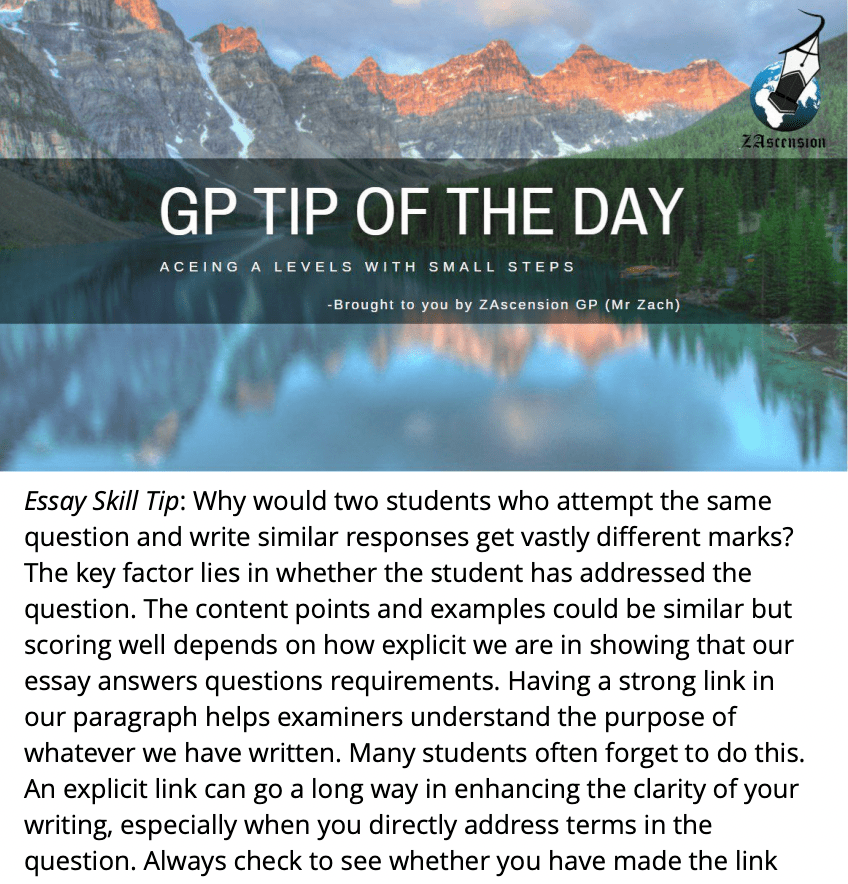
Image adapted from: ZA Ascension
There are Telegram groups with GP resources that you can subscribe to. ZA Ascension has a GP FAQ or tip of the day. The Indigo Oracle features examples of possible essay questions with accompanying articles or videos.
Free model essays are available online from many websites such as The Knowledge Loft, GP Model Essays and Tick.
Most JCs will give out booklets with model essays. Pro tip: KS Bull from RI is highly regarded, so get from your friends from there if you can.
6. Look for Google Drives like “The Holy Grail”
The Holy Grail is a publicly-accessible online collection of past-year exam papers from different schools. You can take a look at the GP papers there for a good selection of common topics and the ways questions can be asked about them.
The Drive doesn’t just contain past-year papers for all the A level subjects. It also has mini grails for O level and PSLE papers – although they are not as updated – so you can share this resource with your younger siblings and friends.
7. Make lists of good vocabulary

Make lists of good vocabulary – with synonyms and antonyms – and phrases such as idioms and metaphors.
However, remember that big words are not necessarily good words if you don’t know how to use them properly – clear, concise sentences that convey your meaning accurately are far more important.
8. Do 20-min essay dry runs to hone your evaluation skills
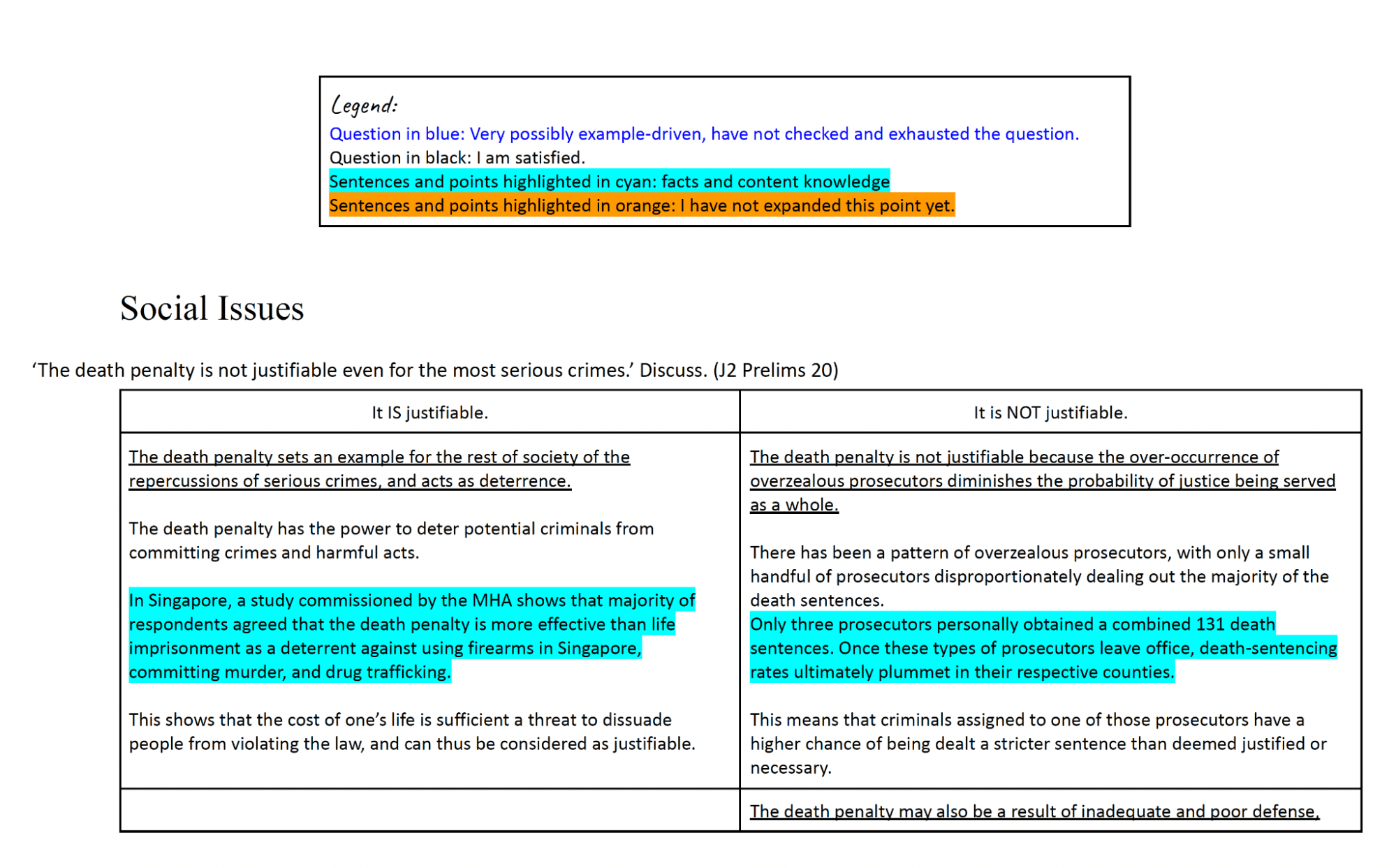
Image credit: Enya
Now that you’ve done your reading, research and thinking, it’s time to amass a content bank of essay outlines across different topics, with some points supporting your argument and others refuting it. It’ll take you around 20 minutes for each outline – 5 minutes to analyse the question, and another 15 minutes to come up with a thesis statement, introduction and 4 topic sentences.
“Everyone can memorise model essays. Writing outlines is also a good practice for your evaluation and nuancing skills, which is what sets your essay apart from everyone else’s,” says Steph.
While making GP notes can be a pain, doing it will be more useful in the long run as you can remember them better, says Gladys. It’ll be much more useful than memorising other people’s notes or model essays and then regurgitating them during your General Paper exams.
9. Avoid practising essay-writing on devices
We love our devices and can type at 80 words per minute. Enya recommends not just typing, but physically writing out your essays with pen and paper to train yourself to plan and write an essay legibly and quickly within the time limit.

Image credit: Pexels
Even if your essay is brilliant, you need to have handwriting that your examiner can actually read to ace your General Paper exam.
10. Don’t be paiseh to book your GP tutor for consults
“Take the initiative to consult your General Paper tutor on how you can improve on your writing. You can consult them with your friends in a group so it’s less scary. You can also ask other GP tutors – not just your own,” suggests Krista.
Grab some friends and form study groups to discuss GP topics together. That way, you can get a wider understanding of possible topics and consider other points of view. You can include friends from other JCs as their schools might teach GP in ways different from how your school does it.
For those who go for tuition, our GP tutor advises that if what your tuition teacher says conflicts with what you’ve been taught in JC, you should check back with your teacher in school to clarify your doubts.
11. Spend 5-10 minutes planning before writing
Don’t rush into writing – spend some time planning your Paper 1 essay first, so that you don’t blank out while writing your essay.
Write down all your ideas for your chosen topic, then organise them in order of the framework of the essay you’re intending to write, e.g. Plus Minus Interesting (PMI); Strength, Weakness, Opportunity and Threat (SWOT); short term/long term; or other brainstorming techniques that you might be familiar with.
12. Vary your sentence structures and lengths
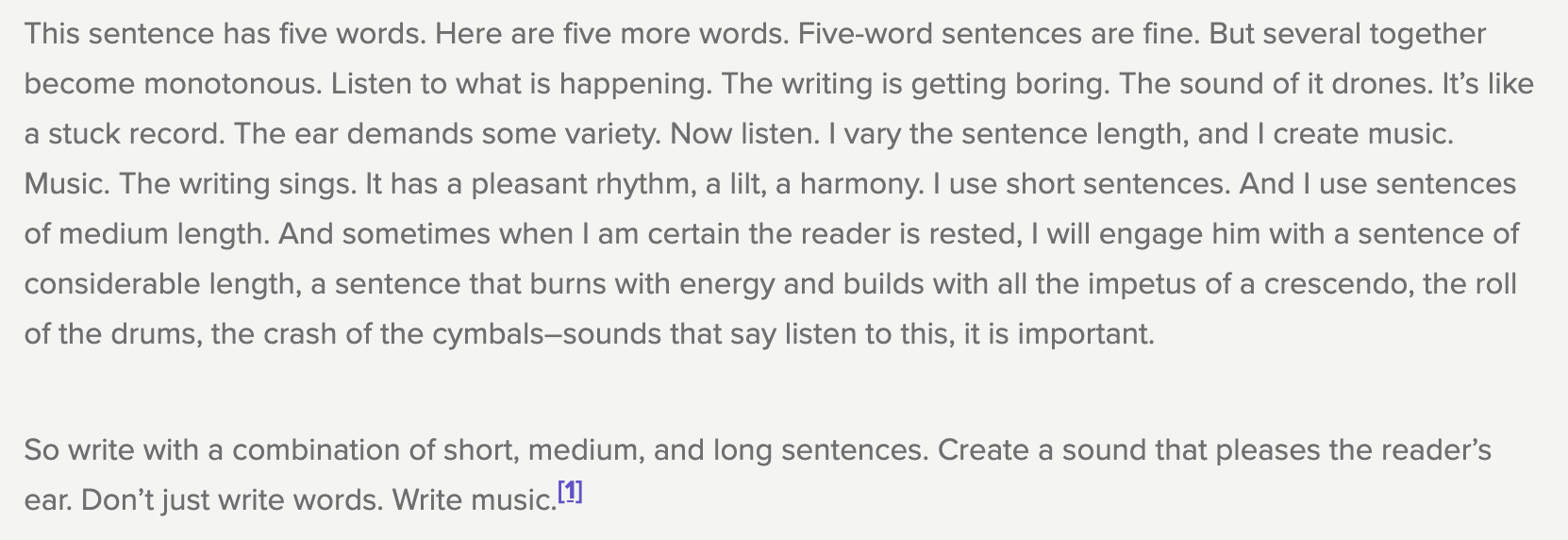
Writing advice from Gary Provost.
Image adapted from: College Writing Handbook
Make sure you vary your sentence structures and lengths to engage the reader. Big words and complex sentences don’t necessarily make for a good essay – it’s better to have grammatical, meaningful sentences that help your argument be organised and easy to follow.
If you’re not sure what the word means, or how to use a certain kind of punctuation – hello, semicolon, I’m looking at you – don’t use it.
13. Use your own words
For the summary writing question in Paper 2 of your General Paper exam, make sure you put the information concisely and in your own words. To avoid repetition, our GP tutor advises rewording, using synonyms, recasting of points by flipping sentence structures so that the adverbial phrase is in front, or the substitution of key words without losing meaning.
Don’t spend too much time on this section, as it’s only 8 marks – spend perhaps 20 minutes on it, and definitely not more than 30 minutes. You’ll want to have enough time to tackle the rest of the questions as well.
Ace your General Paper at A levels
While all this might sound a little intimidating for H1 paper, remember that every little bit counts when it comes to getting a good overall A level score. There’s no magic pill to doing well for exams – it’s all about hard work and consistency.
If you follow these tips for acing your General Paper at A levels, by the time your prelims roll around, you’d have amassed a sizeable bank of notes and information you can refer to while studying, and be well-versed in thinking about and writing on the possible topics that will eventually come out.
While you’re busy acing your exams, check out our other study-related posts:
- Free study spots in Singapore
- Quiet cafes to study at
- Best table lamps for to study with
- Unofficial guide to NUS
